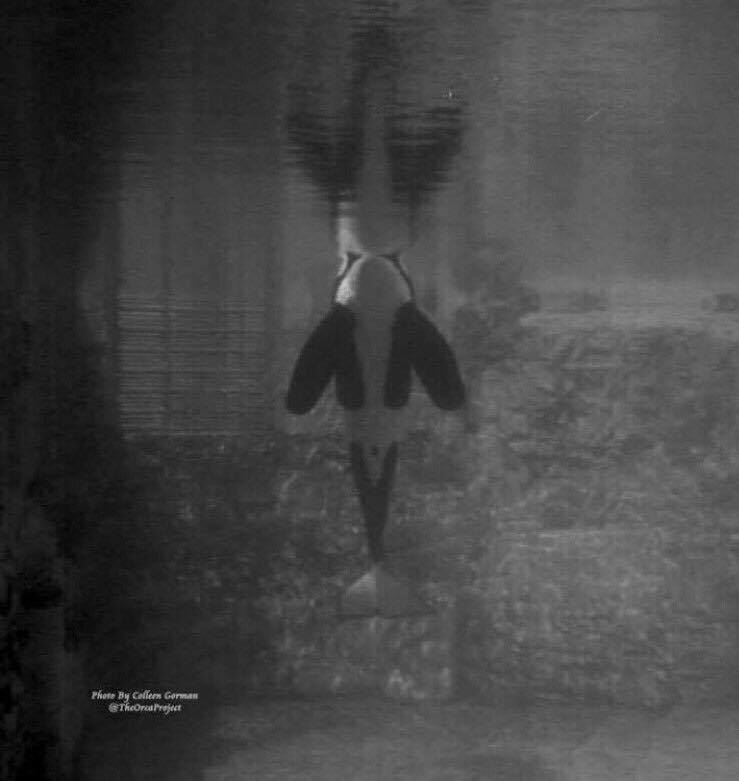Captive Orca Tilikum, Star of the 'Blackfish' Movie, Has Died at SeaWorld - But His Legacy Lives On6/1/2017 Today the orca community has suffered a devastating loss. Tilikum, the much loved star of 'Blackfish' and captive of Seaworld Orlando for the last 25 years, has passed away. In the wild, male orca can live up to 50-60 years of age; Tilikum died at the estimated age of 36. SeaWorld has said, “The SeaWorld family is deeply saddened to announce that one of its most well-known orcas, Tilikum, has passed away. Tilikum passed away early this morning, January 6, surrounded by the trainers, care staff and veterinarians that provided him around-the-clock world-class care.” Tilikum was the largest orca in captivity, measuring 22.5 feet in length and weighing in at over 12,000 lbs. He had a very distinct dorsal fin measuring 6.5 feet which was completely collapsed to his left side. He was believed to be a North Atlantic Type 1 orca from the resident fish-eating population that inhabits Icelandic waters. Tilikum was one of over 50 orca captured in Icelandic waters. He was captured in 1983 at the age of two, along with Samoa and Nandu. Immediately after his capture, he was held in a small, concrete holding tank for almost a year near Reykjavik, before being transferred to Sealand of the Pacific in Victoria, Canada. As a juvenile, he was refused food if he did not perform tricks and was often 'raked' and bullied by the two larger females in his tank. He was transferred to Seaworld in 1992 where he lived out the rest of his life performing in Shamu shows and siring multiple offspring. Tilikum was associated with the deaths of three humans during his life in captivity. The first was in February 1991 at Sealand of the Pacific. Keltie Byrne, a 20 year old orca trainer at Sealand, slipped into the pool and was repeatedly pulled underwater by Tilikum and the two females in his tank, until she ultimately drowned. In July 1999, civilian Daniel P. Dukes was found naked, draped over the back of Tilikum in his SeaWorld orca tank. Dukes had reportedly hidden in the park after closing and entered the orca pool, unbeknown to security staff. Although hypothermia and ultimately drowning were given as the cause of death, Dukes sustained multiple blunt-force traumas pre and post mortem. In February 2010, Tilikum was involved in the death of one of Seaworld's most senior trainers: Dawn Brancheau. During a routine "Dine with Shamu" event, Tilikum reportedly grabbed the trainer by the arm and dragged her into the pool. She too sustained horrific trauma and it was Brancheau’s death that ignited the captive orca welfare movement as we know it today. Following this trainer's death, Seaworld was banned from putting trainers in the water with orca. To date, Tilikum has sired 21 offspring, only ten of which are still alive today. His first calf, Kyuquot, was born in December 1991 at Sealand and later transferred to Seaworld San Antonio. At 24 years of age, Kyuquot is the oldest of Tilikum’s offspring. Tuar (1999), Nakai (2001), Ikaika (2002), Malia (2007), Sakari (2010) and Makaio (2010) currently live in Seaworld’s American amusement parks, while Tekoa (2000), Kohana (2002, whose own calves resulted from inbreeding) and Skyla (2004) reside in Loro Parque, Tenerife, on loan from SeaWorld, along with another SeaWorld orca who also killed his trainer. Five of Tilikum’s calves were stillborn, while others died from disease and chronic health issues. During his time at SeaWorld, Tilikum formed a close companionship with Taima, fathering all of her calves until she died during labour in 2010.
Alongside Keiko, the star of the movie 'Free Willy', Tilikum was arguably the most well-known orca in captivity due to the 2013 documentary 'Blackfish'. Throughout the film, former Seaworld trainers talk about their experiences with Tilikum. They highlight the fact that trainers were not made aware of Tilikum’s dangerous past before they started interacting with him, and that the initial reports released by Seaworld surrounding Brancheau’s death hinted at ‘trainer error’ despite several eye-witness accounts stating otherwise. The film had a huge impact and raised awareness of the conditions and controversies of orca captivity. It was following this now wide-reaching awareness of the impacts on orca welfare due to captive confinement that SeaWorld announced it would be ending its captive orca breeding programme. This surprising and welcome change of direction followed news that Tilikum had fallen seriously ill back in March 2016. At the time, there appeared to be a lack of transparency in understanding what was wrong with Tilikum and whether confinement was the cause of his deterioration. Now, SeaWorld has stated that, “…The official cause of death will not be determined until the necropsy is completed, the SeaWorld veterinarians were treating a persistent and complicated bacterial lung infection. The suspected bacteria is part of a group of bacteria that is found in water and soil both in wild habitats and zoological settings.” Prior to today’s announcement, the last update on Tilikum’s progress was released by Seaworld on 31 August 2016, indicating that he had been making good progress towards recovery. Unfortunately, this was not the case. Tilikum is now gone, but he leaves behind a poignant legacy: He will forever remind us of the tragedy that can occur, for both orca and humans alike, when freedom and choice is stolen from sentient beings designed by nature to be wild and free. Tilikum has found his freedom - we are sorry that it was in death he had to find it.
9 Comments
|
Archives
January 2017
|


 RSS Feed
RSS Feed
